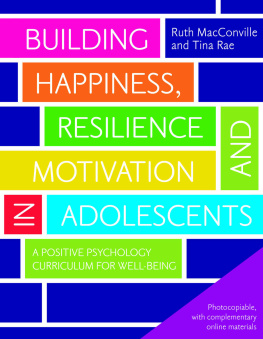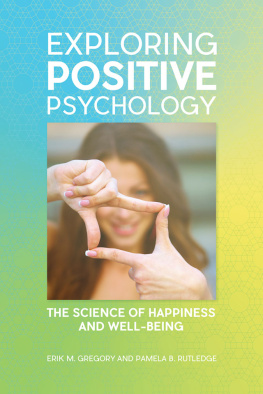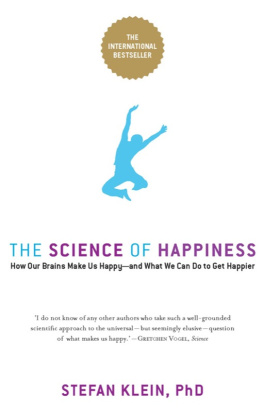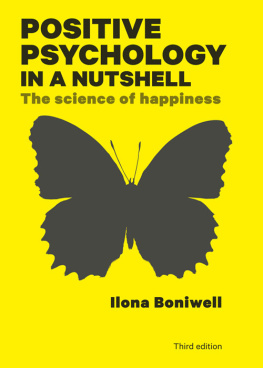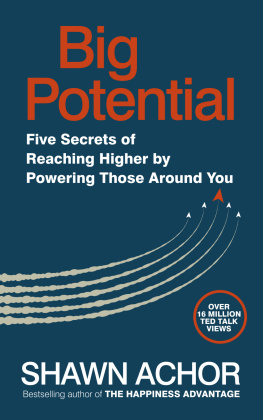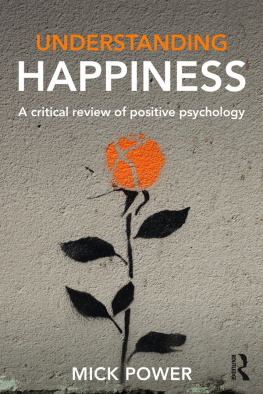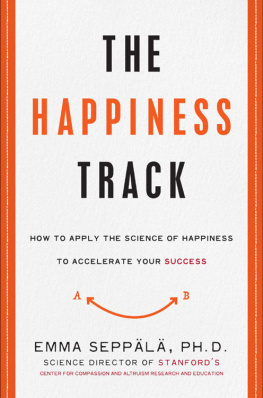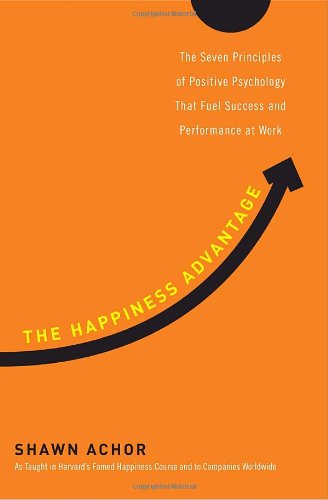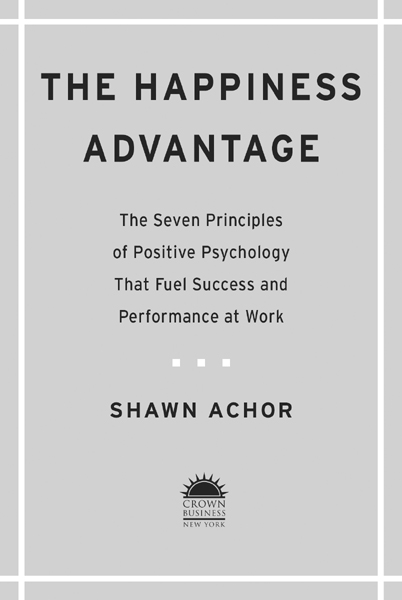Copyright 2010 by Shawn Achor
All rights reserved.
Published in the United States by Crown Business, an imprint of the Crown Publishing Group, a division of Random House, Inc., New York.
www.crownpublishing.com
CROWN BUSINESS and the Crown Business colophon are trademarks of Random House, Inc.
Library of Congress Cataloging-in-Publication Data
Achor, Shawn.
The happiness advantage: the seven principles of positive psychology that fuel success and performance at work / Shawn Achor.1st ed.
1. HappinessPsychological aspects. 2. WorkPsychological aspects. 3. Positive psychology. I. Title.
BF575.H27A27 2010
158.7dc22 2010006621
eISBN: 978-0-307-59156-2
v3.1
To my parents, both teachers, who have dedicated their lives to the belief that we can all shine brighter
ACKNOWLEDGMENTS
This section has been the most fun part of writing this book. I am humbled and excited knowing that every word in this book has been shaped by the people in my life. I hope I have written in such a way that you can still hear their voices.
Thank you to my mentor, Dr. Tal Ben-Shahar. I remember meeting him at a caf in Harvard Square to discuss a new class on happiness. I found him to be a kind, mild, and unimposing man. Little did I know this humble stranger would soon transform Harvard, and my life in the process. It took him only one tall coffee to reorient my entire world, helping me see how my study of religious ethics at the divinity school paralleled the questions asked in the science of positive psychology. He encouraged my growth and forgave my failings. Knowing him is one of my daily gratitudes; for without him, I would not be in this field nor be writing this book today.
Thank you to Elizabeth Peterson, one of my former students from the Positive Psychology class at Harvard, who later came to join my company. She, like Tal, is a loyal guardian of positive psychology, believing that it must not only remain a science, but must also be lived. Liz has painstakingly edited every word of this book for a year, and has in the midst of this challenge remained a true friend.
Thank you to my mother, a high school English teacher and now college freshmen advisor at Baylor University, and to my father, a professor of psychology also at Baylor, who gave me the twin gift of a love for learning and a love for teaching. I am grateful to my sister, Amy, and brother, Bobo, who have kept the fires burning bright enough to remind me that I still had a home as I traveled nonstop for two years through forty countries.
Thank you to Mr. Hollis, who offered his genius as a public high school teacher; he made me fall in love with academia. Thank you to Brian Little, who was the best professor I had at Harvard and who I studied fervently as his Teaching Fellow, trying to learn the art of lecturing from a master. Thank you to Professor Phil Stone for inspiring Tal and me. Thank you to Professor Ellen Langer for letting me join her lab and to learn how to think outside of the norms of what academia expects. Thank you to my literary agent, Rafe Sagalyn, for making this book possible; Tal said he was the best and he was right. Thank you to Roger Scholl at Broadway Books, who believed in this book, and to Talia Krohn at Broadway, who edited this book assiduously and with great insight.
Thank you to the Young Presidents Organization for helping me meet so many new friends all over the world from Asia to South America. Thank you to Salim Dewji for arranging my speaking tour through Africa, a lifelong dream. Thank you to Michelle Blieberg at UBS and Lisanne Biolos at KPMG for their friendship and for inviting me into their companies to test our theories. Thank you to John Galvin and Steven Schragis, who started my speaking career, propelling me out of the classroom and into the public with talks at One Day University. Thank you to Michelle Lemmons, Greg Kaiser, and Greg Ray from International Speakers Bureau for partnering with me and for caring so much for building up their speakers. Thank you to my friends at the Washington Speakers Bureau and to C. J. Lonoff at Speaking Matters for helping bring this message worldwide. Thank you to Carrie Callahan for her help with PR for me. And thank you to Dini Coffin and Stewart Clifford from Enterprise Media for bringing this science to video.
I have been blessed with a network of friends too large to name here, but a special thank you to the following people whose friendship and encouragement have be integral to my happiness and success over the past year: Angie Koban, Alia Crum, Laura Babbitt and Mike Lampert, Jessica Glazer, Max Weisbuch and Amanda Youmans, Judy and Russ Miller and Caroline Sami, Caleb Merkl, Olivia Shabb, and Brent Furl.
If you have never written an acknowledgement page, try taking an afternoon to do it. I have just found that you cannot help but be happy and humbled being reminded that we are loved and that we do nothing alone.
I look forward to the new friendships and community this book creates.
PART 1
POSITIVE PSYCHOLOGY AT WORK
INTRODUCTION
I f you observe the people around you, youll find most individuals follow a formula that has been subtly or not so subtly taught to them by their schools, their company, their parents, or society. That is: If you work hard, you will become successful, and once you become successful, then youll be happy. This pattern of belief explains what most often motivates us in life. We think: If I just get that raise, or hit that next sales target, Ill be happy. If I can just get that next good grade, Ill be happy. If I lose that five pounds, Ill be happy. And so on. Success first, happiness second.
The only problem is that this formula is broken.
If success causes happiness, then every employee who gets a promotion, every student who receives an acceptance letter, everyone who has ever accomplished a goal of any kind should be happy. But with each victory, our goalposts of success keep getting pushed further and further out, so that happiness gets pushed over the horizon.
Even more important, the formula is broken because it is backward. More than a decade of groundbreaking research in the fields of positive psychology and neuroscience has proven in no uncertain terms that the relationship between success and happiness works the other way around. Thanks to this cutting-edge science, we now know that happiness is the precursor to success, not merely the result. And that happiness and optimism actually fuel performance and achievementgiving us the competitive edge that I call the Happiness Advantage.
Waiting to be happy limits our brains potential for success, whereas cultivating positive brains makes us more motivated, efficient, resilient, creative, and productive, which drives performance upward. This discovery has been confirmed by thousands of scientific studies and in my own work and research on 1,600 Harvard students and dozens of Fortune 500 companies worldwide. In this book, you will learn not only why the Happiness Advantage is so powerful, but how you can use it on a daily basis to increase your success at work. But Im getting excited and jumping ahead of myself. I begin this book where I began my research, at Harvard, where the Happiness Advantage was born.


